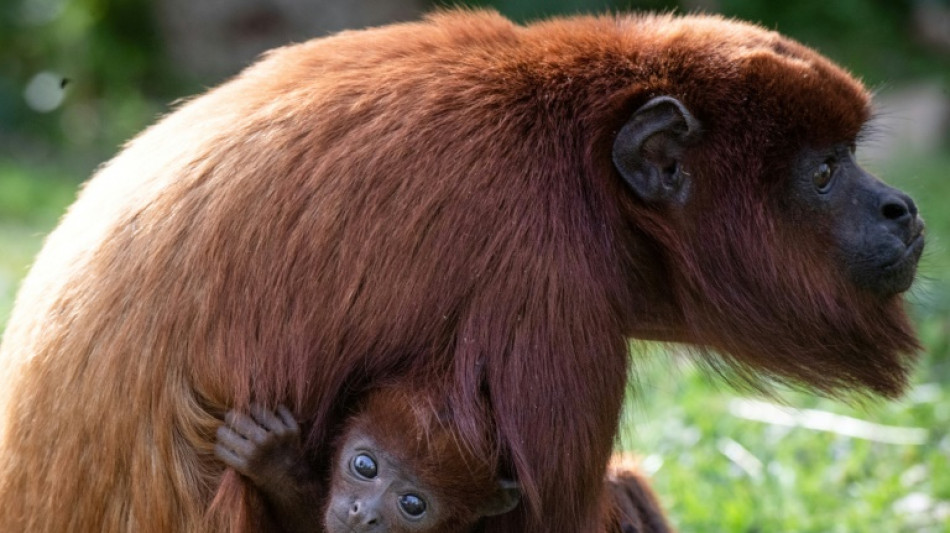
-
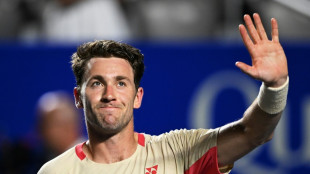 Ruud keeps Barcelona Open defence on course
Ruud keeps Barcelona Open defence on course
-
Trump tariffs could put US Fed in a bind, Powell warns

-
 CONCACAF chief rejects 64-team World Cup plan for 2030
CONCACAF chief rejects 64-team World Cup plan for 2030
-
Putin praises Musk, compares him to Soviet space hero
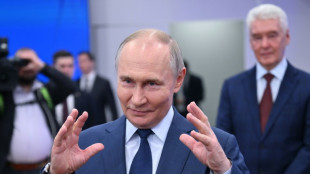
-
 Son to miss Spurs' Europa League trip to Frankfurt
Son to miss Spurs' Europa League trip to Frankfurt
-
US senator in El Salvador seeking release of wrongly deported migrant

-
 Trump tariffs could put the US Fed in a bind, Powell warns
Trump tariffs could put the US Fed in a bind, Powell warns
-
US judge says 'probable cause' to hold Trump admin in contempt

-
 India opposition slams graft charges against Gandhis
India opposition slams graft charges against Gandhis
-
Nate Bargatze to host Emmys: organizers

-
 US Fed Chair warns of 'tension' between employment, inflation goals
US Fed Chair warns of 'tension' between employment, inflation goals
-
Trump touts trade talks, China calls out tariff 'blackmail'

-
 US judge says 'probable cause' to hold govt in contempt over deportations
US judge says 'probable cause' to hold govt in contempt over deportations
-
US eliminates unit countering foreign disinformation

-
 Germany sees 'worrying' record dry spell in early 2025
Germany sees 'worrying' record dry spell in early 2025
-
Israel says 30 percent of Gaza turned into buffer zone

-
 TikTok tests letting users add informative 'Footnotes'
TikTok tests letting users add informative 'Footnotes'
-
Global uncertainty will 'certainly' hit growth: World Bank president

-
 EU lists seven 'safe' countries of origin, tightening asylum rules
EU lists seven 'safe' countries of origin, tightening asylum rules
-
Chelsea fans must 'trust' the process despite blip, says Maresca

-
 Rebel rival government in Sudan 'not the answer': UK
Rebel rival government in Sudan 'not the answer': UK
-
Prague zoo breeds near-extinct Brazilian mergansers

-
 Macron to meet Rubio, Witkoff amid transatlantic tensions
Macron to meet Rubio, Witkoff amid transatlantic tensions
-
WTO chief says 'very concerned' as tariffs cut into global trade

-
 Sports bodies have 'no excuses' on trans rules after court ruling: campaigners
Sports bodies have 'no excuses' on trans rules after court ruling: campaigners
-
Zverev joins Shelton in Munich ATP quarters

-
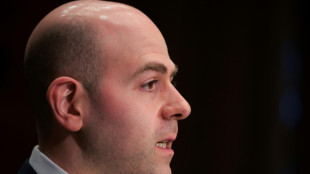 The Trump adviser who wants to rewrite the global financial system
The Trump adviser who wants to rewrite the global financial system
-
US senator travels to El Salvador over wrongly deported migrant

-
 UN watchdog chief says Iran 'not far' from nuclear bomb
UN watchdog chief says Iran 'not far' from nuclear bomb
-
Trump says 'joke' Harvard should be stripped of funds

-
 Macron vows punishment for French prison attackers
Macron vows punishment for French prison attackers
-
Canada central bank holds interest rate steady amid tariffs chaos

-
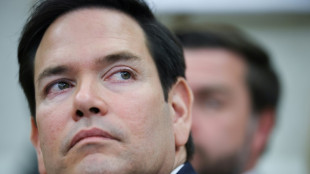 Rubio headed to Paris for Ukraine war talks
Rubio headed to Paris for Ukraine war talks
-
Australian PM vows not to bow to Trump on national interest

-
 New attacks target France prison guard cars, home
New attacks target France prison guard cars, home
-
Global trade uncertainty could have 'severe negative consequences': WTO chief
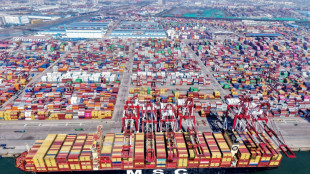
-
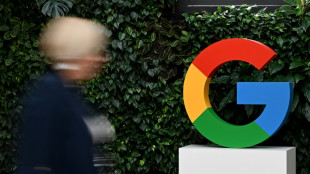 Google facing £5 bn UK lawsuit over ad searches: firms
Google facing £5 bn UK lawsuit over ad searches: firms
-
Onana to return in goal for Man Utd against Lyon: Amorim

-
 Tiktok bans user behind Gisele Pelicot 'starter kit' meme
Tiktok bans user behind Gisele Pelicot 'starter kit' meme
-
'Put it on': Dutch drive for bike helmets
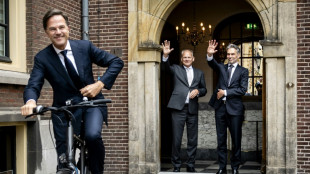
-
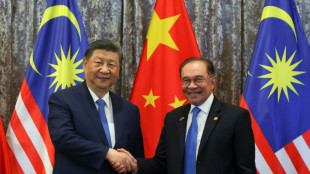 China's Xi meets Malaysian leaders, vows to 'safeguard' Asia allies
China's Xi meets Malaysian leaders, vows to 'safeguard' Asia allies
-
France urges release of jailed Russian journalists who covered Navalny

-
 Gabon striker Boupendza dies after 11th floor fall
Gabon striker Boupendza dies after 11th floor fall
-
UK top court rules definition of 'woman' based on sex at birth
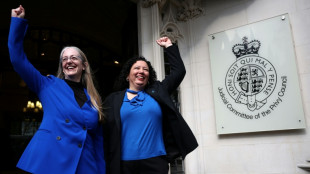
-
 PSG keep Champions League bid alive, despite old ghosts reappearing
PSG keep Champions League bid alive, despite old ghosts reappearing
-
Stocks retreat as US hits Nvidia chip export to China

-
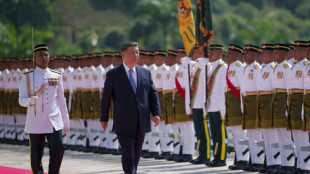 China's Xi meets Malaysian leaders in diplomatic charm offensive
China's Xi meets Malaysian leaders in diplomatic charm offensive
-
Israel says no humanitarian aid will enter Gaza

-
 Anxiety clouds Easter for West Bank Christians
Anxiety clouds Easter for West Bank Christians
-
Pocket watch found on Titanic victim to go on sale in UK


More protected areas won't save biodiversity, warn experts
Expanding nature preserves will not be enough to stem a rising tide of extinctions, a panel of experts warned Wednesday, taking aim at a draft treaty tasked with rescuing Earth's animal and plant life.
Setting aside at least 30 percent of both land and oceans as protected zones is the cornerstone target of the so-called global biodiversity framework to be finalised in May at UN negotiations in Kunming, China.
But a report by more than 50 top experts said the draft plan still falls far short of what is needed.
"We're in the middle of a biodiversity crisis, with a million species at risk of extinction," lead author Paul Leadley, a professor at Paris-Saclay University, told AFP.
"There's good evidence that we will fail again to meet ambitious international biodiversity objectives if there's too much focus on protected areas at the expense of other urgent actions."
The plan, under negotiation by nearly 200 nations, sets a score of targets for 2030 -- and aims by 2050 to reverse biodiversity loss and be "living in harmony with nature."
The world failed almost entirely to reach a similar set of 10-year objectives set a decade ago at UN talks in Aichi, Japan.
"We keep trying to treat a critically ill patient with plasters -- that has to stop," said Leadley.
Echoing a similar warning issued by the UN's science advisory panel for climate change, Leadley and his colleagues said reversing the damage done to nature will require "transformative change" in society, starting with the way we produce and consume food.
- Multiple drivers -
Policymakers must also realise that all the drivers of extinction -- habitat loss and fragmentation, over-hunting for food and profit, pollution, the spread of invasive species -- must be tackled at once.
"Biodiversity loss is caused by multiple direct drivers in nearly all cases, meaning that actions on only one or a few will be insufficient to halt continued loss," the report said.
Climate change is also rapidly emerging as a major threat to many animal and plant species on land and in the oceans, outpacing their ability to adapt.
Limiting global warming to 1.5 degrees Celsius above preindustrial levels -- "essential" for protecting nature -- is not adequately reflected in the draft targets, the authors say.
Earth's surface has already warmed 1.1C, enough to unleash a crescendo of climate-enhanced storms, heatwaves, droughts and flooding.
And it works both ways, the report warns: "Protecting and restoring biodiversity are key to achieving the climate mitigation and adaptation goals of the Paris Agreement."
- Nature-based solutions -
As with climate, there's no time to lose.
"The sooner we act the better," said co-author Maria Cecilia Londono Murcia, a researcher at Humboldt Institute in Colombia.
"Time lags between action and positive outcomes for biodiversity can take decades."
The report also takes the draft treaty to task for not spelling out how goals will be achieved and enforced.
Targets are all well and good, it suggests, "but it is how these targets are implemented ... that will determine success."
Other targets set for 2030 include:
- reducing by 50 percent the rate at which alien species are spreading across the globe;
- reducing nutrients such as fertiliser leaching into the environment by at least half, and pesticides by at least two-thirds;
- eliminating the discharge of plastic waste;
- using nature-based solutions to cut greenhouse gas emissions by at least 10 billion tons of CO2 or its equivalent;
- reducing subsidies that harm biodiversity by at least $500 billion (440 billion euros) per year.
"For every euro we spend globally to help biodiversity, we spend at least five on things that destroy it," said co-author Aleksandar Rankovic, a researcher at the Paris Institute of Political Studies.
Nations will gather in Geneva in March for technical meetings ahead of the crunch talks in April and May.
J.Horn--BTB
